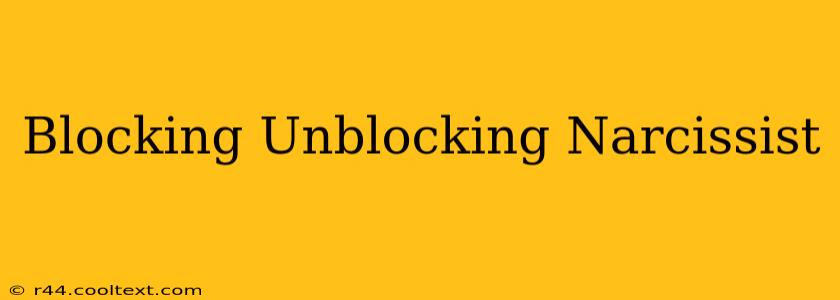Dealing with a narcissist is rarely straightforward, and the decision to block or unblock them on social media or your phone adds another layer of complexity. This isn't just about managing your online presence; it's about managing your mental health and well-being. This post explores the intricate dance of blocking and unblocking a narcissist, examining the potential benefits and drawbacks of each approach.
Why Block a Narcissist?
The primary reason to block a narcissist is self-preservation. Constant contact, even indirect contact through social media, can be incredibly damaging. Narcissists are masters of manipulation, and their presence in your digital life can trigger:
- Emotional Rollercoasters: Their posts, even seemingly innocuous ones, can be designed to provoke a reaction, pulling you back into their cycle of abuse.
- Gaslighting and Manipulation: They might use social media to spread misinformation about you, subtly undermining your self-esteem and credibility.
- Stalking and Harassment: In extreme cases, blocking is essential to prevent online harassment and stalking.
Blocking provides crucial boundaries. It's a powerful tool to reclaim control over your emotional well-being and create a safe digital space. This is particularly important if you're recovering from narcissistic abuse.
The Allure of Unblocking: Why People Do It
Despite the clear benefits of blocking, many find themselves unblocking a narcissist. This often stems from:
- Hope for Reconciliation: A misguided belief that unblocking will lead to a positive change in the narcissist's behavior. This is rarely the case.
- Curiosity and Need for Validation: The desire to see what the narcissist is doing, a subconscious need for their approval or attention.
- Trauma Bonding: A powerful emotional connection that keeps victims tied to their abusers, making it difficult to sever ties completely.
- Fear of Missing Out (FOMO): A feeling that by blocking them, you might miss out on something important, despite the high likelihood this isn't true.
Unblocking, therefore, can be a setback in your healing process. It can reignite old wounds and prolong the cycle of abuse.
Navigating the Decision: What's Right For You?
The decision to block or unblock a narcissist is deeply personal. There's no right or wrong answer, but careful consideration is key. Ask yourself:
- What are my goals? Am I aiming for healing and self-protection? Or am I hoping for reconciliation?
- What is the potential cost? How will unblocking impact my emotional well-being?
- What support system do I have? Do I have friends, family, or therapists who can help me navigate this decision and its potential consequences?
Prioritizing your mental health is paramount. If unblocking feels risky or likely to trigger negative emotions, it's best to maintain the block. Healing from narcissistic abuse takes time and commitment, and protecting your emotional space is crucial to that process.
Beyond Blocking: Strategies for Healing
Blocking is often a necessary first step, but it's rarely enough on its own. Consider these additional strategies for healing from narcissistic abuse:
- Therapy: A therapist specializing in narcissistic abuse can provide invaluable support and guidance.
- Support Groups: Connecting with others who have experienced similar situations can be incredibly validating and empowering.
- Self-Care: Prioritizing your physical and emotional well-being is essential to recovery.
Remember, you deserve to live a life free from manipulation and abuse. Choosing to block a narcissist is an act of self-love and a crucial step toward healing and reclaiming your life.

